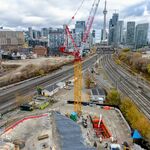andrewpmk
Senior Member
Yes....if we depopulated the GTA by about 5 million people, we would probably lick the congestion issue quite nicely. I just don't know if that is a very practical solution.
A: Toronto does not have a "lousy" transit system. Toronto has good ridership per capita as well as a high rate of "choice" riders. Especially in the core. We also have high density TOD development....and not just in the core.
B: Toronto certainly does not have a relative lack of roads....anywhere.
And those unbuilt expressways would not have solved any problems...they would have made the current problem worse. The 407 was a smart move....build another cross-town expressway far enough from the core....and toll it. That expressway works quite nicely and doesn't cause city streets to be clogged.
My point is that the best cities have both good transit and good roads. Toronto's transit system is lousy (compared to say Madrid) but you also notice how Toronto has a much lower density of expressways compared to Madrid and so how Madrid has noticeably better traffic (except the inner ring road M30 and the core area which has quite severe congestion, but traffic in the suburbs is much better, even though the majority of Madrid highways are not toll). Instead Toronto decided to build one very wide road (the 401) which is horribly congested with no alternatives except a very expensive toll road (the 407).
I think that Toronto does have a lack of expressways in the old city and Scarborough which have a fairly low number of expressways per capita. Mississauga on the other hand has a lot of expressways per capita, and the 401/403/410 interchange hellhole suffers from horrible traffic largely due to an utter lack of decent transit in the nearby employment areas but elsewhere traffic is generally better than Toronto. There is no way to build more expressways in Toronto however due to high land costs and the very high costs of tunneling, so this is a non starter.
In a big city it is pretty much impossible to expand roads alone to eliminate traffic congestion because it is prohibitively expensive to make roads wide enough. However Madrid shows that good roads+good transit can greatly reduce traffic congestion, while London shows that lousy roads+good transit results in horrible traffic congestion.




